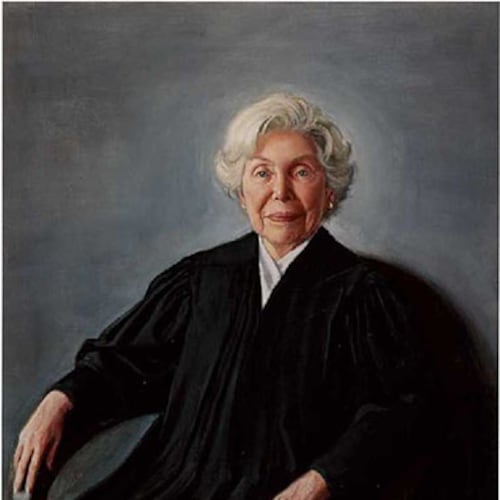The Georgia Supreme Court on Monday considered whether two Marietta lawyers can continue to represent the former housekeeper of Waffle House chairman Joe W. Rogers Jr. after she secretly videotaped their sexual trysts inside the executive's home.
The former housekeeper, Mye Brindle, and her lawyers, David Cohen and John
Credit: Bill Rankin
Credit: Bill Rankin
Butters, are appealing a decision to disqualify the attorneys from the fiercely litigated case that has spawned civil lawsuits on multiple fronts, a criminal indictment and mountainous legal fees. Justices peppered attorneys representing both sides with pointed questions during the 40-minute-long arguments. The court will issue its decision in the coming months.
"This is a disqualification case in which lawyer and client have been pitted against each other, and that shouldn't have happened," attorney Darren Summerville, told the justices, arguing on behalf of his client, Brindle, and Cohen and Butters.
In this case, Brindle and her lawyers "stand aligned," and she believes her lawyers have done "a reasonable, or even excellent job," Summerville said.
Not so, said Robert Ingram, a lawyer for Rogers, who sat in court watching the arguments with his wife Fran.
"This case presents the Supreme Court the opportunity to send what I think is a well-needed message to the bench and the bar, that if a lawyer assists a client ... in furtherance of illegal activity, trial courts have the authority to disqualify the lawyer from representing the same client in litigation arising from that illegal and criminal activity," Ingram said.
Credit: Bill Rankin
Credit: Bill Rankin
Brindle secretly recorded the June 20, 2012, video of Rogers in compromising situations in the bedroom of his Fulton County home. She also filmed Rogers as he stood naked shaving his face in his bathroom, according to court records.
During Monday's arguments, Ingram said Cohen had purchased the video camera for Brindle before she made the recordings and that investigators had warned Brindle's attorneys that secretly videotaping Rogers would be illegal.
At the outset of the case, Brindle accused Rogers of sexual harassment. Cohen also sent Rogers a letter with a "host of horribles," advising him to end the matter with a financial settlement, Ingram said. Among Cohen warned that public disclosure of the sensitive sexual matter could lead to intrusive government investigations, criminal charges, incarceration, divorce and "the destruction of families."
Brindle's lawyers later demanded $12 million to settle the case, an offer Rogers rejected, court records show. Rogers has acknowledged he had "infrequent sexual encounters" with Brindle. But he denied sexually harassing her.
Rogers later filed a lawsuit against Brindle and her attorneys, alleging invasion of privacy and infliction of emotional distress. During this litigation, Cobb County Superior Court Judge Robert Leonard concluded that Brindle's videotaping of Rogers in his home has been illegal conduct.
Leonard, who has since removed himself from the case, later granted Rogers' motion to disqualify Cohen and Butters from representing Brindle, finding they had a conflict of interest. If a criminal investigation ensued, there could be a situation were Brindle and the lawyers would be "pointing fingers at each other about the planning of the video," Leonard said.
The Georgia Court of Appeals upheld Leonard's disqualification ruling, leading to the appeal heard Monday by the state Supreme Court.
Credit: Bill Rankin
Credit: Bill Rankin
Justice David Nahmias questioned Summerville about the possible conflict of interest with regards to Brindle and her lawyers.
"There seems to be a lot of evidence in the record that her lawyers were involved, at least around that decision to take the video, whether they counseled it, whether they counseled against it," Nahmias said. "But if that's true and you have ... a client that has committed an illegal, a criminal act, with a role of her lawyers involved in that criminal act, is that not enough to require disqualification?"
Summerville said he didn't believe so.
Nahmias countered that when he served as U.S. Attorney and when there was a client whose lawyer was suspected of even "a hint" of criminal conduct, that posed a real problem. "Because they are having to watch out for their own interest in not going to jail at the same time they're trying to counsel their client."
Summerville noted that Leonard disqualified the lawyers before Brindle, Cohen and Butters were indicted by a Fulton County grand jury on felony charges.
"This is, at base, a dispute about whether or not sexual encounters between Ms. Brindle and Mr. Rogers were consensual in her workplace, which happened to be Mr. Rogers' home," Summerville said.
He then told the court which has been clearly apparent to anyone following the cases: "There has been at the very least a lot of litigation on this issue."
Summerville disclosed that the case has led to two legal ethics complaints filed
Credit: Bill Rankin
Credit: Bill Rankin
against Cohen and Butters, which have been dismissed. Rogers also wrote letters to the U.S. Attorney's Office in which he asked, unsuccessfully, that federal charges be brought against Brindle and her lawyers, Summerville said.
Rogers and his legal team did convince the Fulton District Attorney's Office to obtain an indictment against Brindle, Cohen and Butters on felony charges. These include allegations of illegally videotaping Rogers inside his home without his consent and extortion. But a Fulton judge dismissed those charges, and the state Supreme Court heard arguments of the DA's Office's appeal of that ruling this past June.
Justices Nahmias and Nels Peterson repeatedly asked Summerville and Ingram about this pending appeal, but the justices didn't disclose which way the court is leaning in its decision.
About the Author
The Latest
Featured





